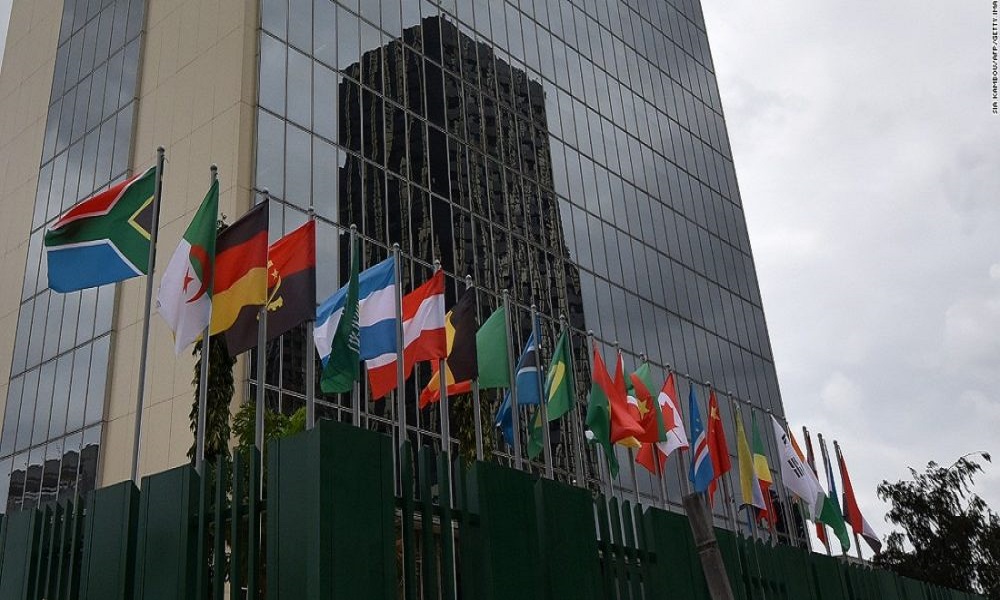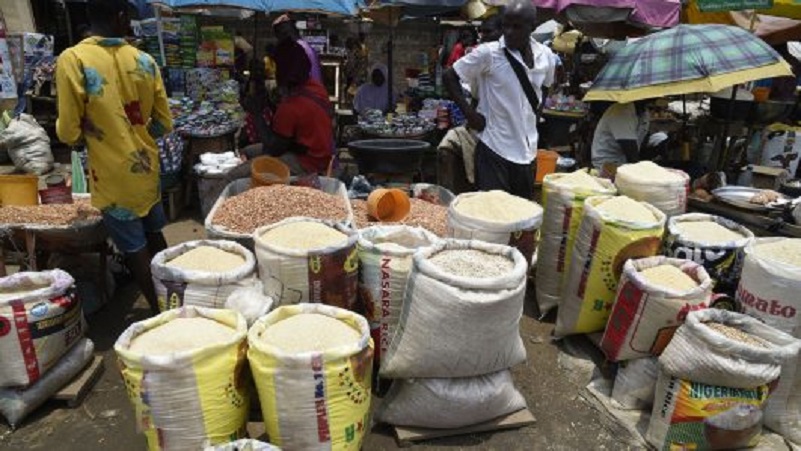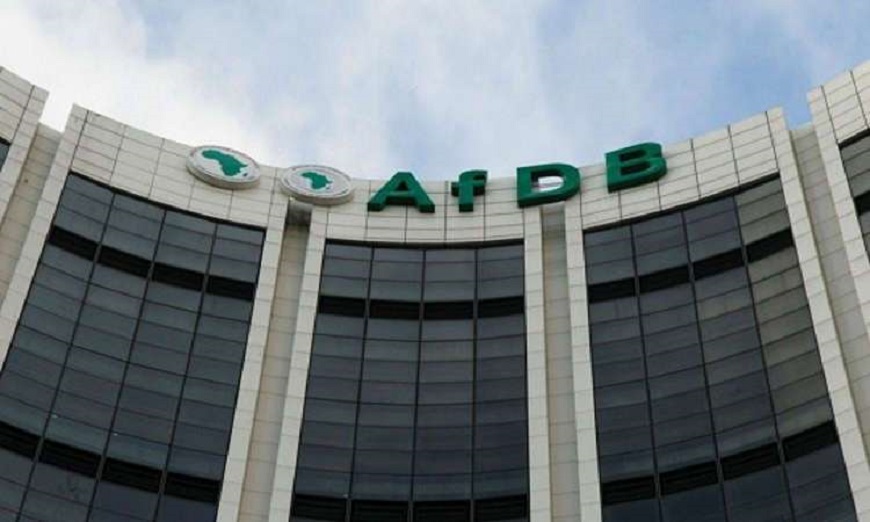Economy
Africa Needs Young Agropreneurs to Tackle Food Security—AfDB

By Dipo Olowookere
The need for African leaders to engage youths in agriculture and make them see the sector as a profitable business venture and not a sign of lacking ambition has been emphasised by the President of the African Development Bank (AfDB), Mr Akinwumi Adesina.
According to this, apart from tackling food security in the continent through this, it would also stem migration of African youths to Europe and the United States of America (USA) in search of greener pastures.
AfDB, while commenting on the occasion of the 2017 World Food Day, highlighted how Africa’s food security depends on attracting young people to agriculture and agribusiness, pointing out that the sector can potentially create wealth and employment for African youth, thereby stemming migration.
World Food Day, celebrated yearly on October 16, promotes worldwide awareness and action for those who suffer from hunger and the need to ensure food security and nutritious diets for all. This year’s theme focuses on the need to ‘Change the future of migration; Invest in food security and rural development’.
The AfDB’s ENABLE Youth program, which grooming a crop of young agriculturists, is on course to make this happen.
Mahmud Johnson, 26, is the Founder of J-Palm Liberia which works to improve income for Liberia’s smallholder oil palm farmers by 50-80%. He is also creating additional jobs for over 1,000 young people to work as sales representatives for his products.
“Despite the tremendous odds, we (African youth) are determined to maximize our abundant agricultural resources to create wealth, jobs, and socioeconomic opportunities in our countries and across the continent. We need our stakeholders to view us as serious partners in Africa’s transformation, and to work with us to expand our enterprises,” Mahmud said.
Mahmud and some of his employees have benefited from capacity building programs under the AfDB’s Empowering Novel Agri-Business-Led Employment for Youth initiative.
Like Mahmud, many African youth are passionate about staying back on the continent to create wealth and employment, if given the tools and opportunities to put their skills to use. Under the ENABLE Youth program, the Bank is working with the International Institute for Tropical Agriculture (IITA) to develop a new generation of young commercial farmers and agribusiness entrepreneurs.
“Our goal is to develop 10,000 such young agricultural entrepreneurs per country in the next 10 years. In 2016, the Bank provided $700 million to support this program in eight countries and we’ve got requests now from 33 countries,” said Adesina.
The Bank considers investment in agriculture as key to making Africa youths prosperous, thereby stemming the tide of migration.
This goal, and theme of 2017 World Food Day, are well aligned with two of the AfDB’s High 5 development priorities – Feed Africa and Improve the quality of life for the people of Africa– said Jennifer Blanke, Vice-President, Agriculture, Human and Social Development at the AfDB.
“A thriving business sector in Africa will provide the jobs and returns that will attract and retain Africa’s best talent on the continent, while improving the quality of life of all Africans,” she said.
With more than 70% of Africans depending on agriculture for their livelihoods, it is imperative for the sector’s full potential to be unlocked, and by doing so help to vastly improve the lives Africans.
Accordingly, one of the goals of Feed Africa is to eliminate hunger and malnutrition by 2025.
Due to the finite nature of mineral resources such as gold, diamonds, crude oil, among others, African countries must diversify their economies. This cannot be done without a significant emphasis on agriculture given that the great majority of Africans depend on it for their livelihoods.
Increased food demand and changing consumption habits driven by demographic factors such as urbanization (internal migration) are leading to rapidly rising net food imports, which will grow from $35 billion in 2015 to over $110 billion by 2025 if trends are left unchecked.
Given that African smallholder farmers are on average about 60 years old, Africa’s food security depends on attracting young people into agriculture and agribusiness and empowering them. Governments can support these shifts through the right enabling environments via policy reforms for increased private investment in agriculture and agribusiness. And also by better articulating the importance of agriculture for their economies in their interaction with the public.
“Food security and rural development are closely interlinked with issues of migration, fragility and resilience. The Horn of Africa and the Sahel provide compelling examples of how global factors such as food insecurity, radical extremism and migration reinforce state fragility and have devastating effects on development,” said Khaled Sherif, AfDB Vice-President for Regional Development, Integration and Business Delivery.
“The lack of economic opportunities, infrastructure, employment opportunities and unpredictable climactic changes in these countries are key sources of fragility that often times result in the forced migration of peoples seeking a desperate alternative. The Bank has, where appropriate, adopted risk-based approaches at both country and regional levels in addressing fragility.”
Ahead of the World Food Day, the AfDB joined Côte d’Ivoire’s Minister of Agriculture and Rural Development and other developing partners on October 14 in a day-long set of activities to promote agriculture as a business. They emphasized the need for governments to invest in agriculture to create jobs and stem the flow of migration that has undermined the security and economies of African countries.
Economy
Flour Mills Supports 2026 Paris International Agricultural Show

By Modupe Gbadeyanka
For the second time, Flour Mills of Nigeria Plc is sponsoring the Paris International Agricultural Show (PIAS) as part of its strategies to fortify its ties with France.
The 2026 PIAS kicked off on February 21 and will end on March 1, with about 607,503 visitors, nearly 4,000 animals, and over 1,000 exhibitors in attendance last year, and this year’s programme has already shown signs of being bigger and better.
The theme for this year’s event is Generations Solution. It is to foster knowledge transfer from younger generations and structure processes through which knowledge can be harnessed to drive technological advancement within the global agricultural sector.
In his address on the inaugural day of the Nigerian Pavilion on February 23, the Managing Director for FMN Agro and Director of Strategic Engagement/Stakeholder Relations, Mr Sadiq Usman, said, “At FMN, our mission is Feeding and Enriching Lives Every Day.
“This is a mandate we have fulfilled through decades of economic shifts, rooted in a culture of deep resilience and constant innovation. We support this pavilion because FMN recognises that the next frontier of global Agribusiness lies in high-level technical exchange.
“We thank the France-Nigeria Business Council (FNBC), the organisers of the PIAS, and our fellow members of the Nigerian Pavilion – Dangote, BUA, Zenith, Access, and our partners at Creativo El Matador and Soilless Farm Lab— we are exceedingly pleased to work to showcase the true face of Nigerian commerce.”
Speaking on the invaluable nature of the relationship between Nigeria and France, and the FMN’s commitment to process and product innovation, Mr John G. Coumantaros, stated, “The France – Nigeria relationship is a valuable partnership built on a shared value agenda that fosters remarkable Intercontinental trade growth.
“Also, as an organisation with over six decades of transformational footprint in Nigeria and progressively across the African Continent, FMN has been unwaveringly committed to product and process innovation.
“Therefore, our continuous partnership with France for the success of the Paris International Agricultural Show further buttresses the thriving relationship between both countries.”
PIAS is one of the most widely attended agricultural shows, with thousands of people from across the world in attendance.
Economy
NEITI Backs Tinubu’s Executive Order 9 on Oil Revenue Remittances

By Adedapo Adesanya
Despite reservations from some quarters, the Nigeria Extractive Industries Transparency Initiative (NEITI) has praised President Bola Tinubu’s Executive Order 9, which mandates direct remittances of all government revenues from tax oil, profit oil, profit gas, and royalty oil under Production Sharing Contracts, profit sharing, and risk service contracts straight to the Federation Account.
Issued on February 13, 2026, the order aims to safeguard oil and gas revenues, curb wasteful spending, and eliminate leakages by requiring operators to pay all entitlements directly into the federation account.
NEITI executive secretary, Musa Sarkin Adar, called it “a bold step in ongoing fiscal reforms to improve financial transparency, strengthen accountability, and mobilise resources for citizens’ development,” noting that the directive aligns with Section 162 of Nigeria’s Constitution.
He noted that for 20 years, NEITI has pushed for all government revenues to flow into the Federation Account transparently, calling the move a win.
For instance, in its 2017 report titled Unremitted Funds, Economic Recovery and Oil Sector Reform, NEITI revealed that over $20 billion in due remittances had not reached the government, fueling fiscal woes and prompting high-level reforms.
Mr Adar described the order as a key milestone in Nigeria’s EITI implementation and urged amendments to align it with these reforms.
He affirmed NEITI’s role in the Petroleum Industry Act (PIA) and pledged close collaboration with stakeholders, anti-corruption bodies, and partners to sustain transparent management of Nigeria’s mineral resources.
Meanwhile, others like the Petroleum and Natural Gas Senior Staff Association of Nigeria (PENGASSAN) have kicked against the order, saying it poses a serious threat to the stability of the oil and gas industry, calling it a “direct attack” on the PIA.
Speaking at the union’s National Executive Council (NEC) meeting in Abuja on Tuesday, PENGASSAN President, Mr Festus Osifo, said provisions of the order, particularly the directive to remit 30 per cent of profit oil from Production Sharing Contracts (PSCs) directly to the Federation Account, could destabilise operations at the Nigerian National Petroleum Company (NNPC) Limited.
Mr Osifo firmly dispelled rumours of imminent protests by the union, despite widespread claims that the controversial executive order threatens the livelihoods of 10,000 senior staff workers at NNPC.
He noted, however, that the union had begun engagements with government officials, including the Presidential Implementation Committee, and expressed optimism that common ground would be reached.
Mr Osifo, who also serves as President of the Trade Union Congress (TUC), expressed concerns that diverting the 30 per cent profit oil allocation to the Federation Account Allocation Committee (FAAC), without clearly defining how the statutory management fee would be refunded to NNPC, could affect the salaries of hundreds of PENGASSAN members.
Economy
Dangote Cement Deepens Dominance, Export Activities With $1bn Sinoma Deal

By Aduragbemi Omiyale
To strengthen its domestic market dominance, drive its export activities, optimise existing operational assets and enhance production efficiency and capacity expansion, Dangote Cement Plc has sealed $1 billion strategic agreements with Sinoma International Engineering for cement projects across Africa.
The president of Dangote Industries Limited, the parent firm of Dangote Cement, Mr Aliko Dangote, disclosed that the deal reinforces the company’s long-term growth strategy and aligns with the broader aspirations of the Dangote Group’s Vision 2030.
According to him, Sinoma will construct 12 new projects and expand others for the cement organisation across Africa, helping to achieve 80 million tonnes per annum (MTPA) production capacity by 2030, while supporting the group’s overarching target of generating $100 billion in revenue within the same period.
Under the Strategic Framework Agreement, Sinoma will collaborate with Dangote Cement on the delivery of new plants, brownfield expansions, and modernisation initiatives aimed at strengthening operational performance across key markets.
The new projects include a new integrated line in Northern Nigeria with a satellite grinding unit, a new line in Ethiopia and other projects in Zambia/Zimbabwe, Tanzania, Sierra Leone and Cameroon. In Nigeria, Sinoma will also handle different projects in Itori, Apapa, Lekki, Port Harcourt and Onne.
The projects signal Dangote Cement’s sustained commitment to consolidating its leadership position within the African cement industry, while enhancing its competitiveness on the global stage.
Chairman of the Dangote Cement board, Mr Emmanuel Ikazoboh, during the agreement signing event in Lagos, explained that the new projects would enable the company to play a critical role in actualising Dangote Group’s Vision 2030.
The new projects, when completed, will increase Dangote Cement’s capacity and dominant position in Africa’s cement industry.
On his part, the Managing Director of Dangote Cement, Mr Arvind Pathak, said the agreement reflects the company’s determination to grow its investments across African markets to close supply gaps and support the continent’s infrastructural ambitions.
According to him, Dangote Cement is committed to making Africa fully self‑sufficient in cement production, creating more value and linkages, leading to increased economic activities and a reduction in unemployment.
-

 Feature/OPED6 years ago
Feature/OPED6 years agoDavos was Different this year
-
Travel/Tourism10 years ago
Lagos Seals Western Lodge Hotel In Ikorodu
-

 Showbiz3 years ago
Showbiz3 years agoEstranged Lover Releases Videos of Empress Njamah Bathing
-

 Banking8 years ago
Banking8 years agoSort Codes of GTBank Branches in Nigeria
-

 Economy3 years ago
Economy3 years agoSubsidy Removal: CNG at N130 Per Litre Cheaper Than Petrol—IPMAN
-

 Banking3 years ago
Banking3 years agoSort Codes of UBA Branches in Nigeria
-

 Banking3 years ago
Banking3 years agoFirst Bank Announces Planned Downtime
-

 Sports3 years ago
Sports3 years agoHighest Paid Nigerian Footballer – How Much Do Nigerian Footballers Earn




















